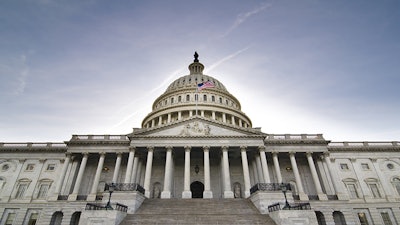
The U.S. House last night approved a spending bill to avoid an impending federal government shutdown. Today, it’s up to the U.S. Senate to pass the bill; otherwise, funding for the federal government ends at midnight.
Without passage of today’s continuing resolution, many areas of federal government spending will expire. For the medical marijuana industry and the fate of the Rohrabacher-Blumenauer amendment, today’s Senate deliberations are critical.
The Rohrabacher-Blumenauer amendment, sponsored by U.S. Rep. Dana Rohrabacher (R-CA) and Earl Blumenauer (D-OR), prevents the Department of Justice (DOJ) from spending federal funds on the prosecution of state-legal medical marijuana operators.
First approved in 2014, the bipartisan amendment has been on every spending bill since it was first introduced.
Today, though, with children’s health care policies and the fate of young immigrants’ citizenship held as political parlays, it’s still an open question whether the U.S. Senate will approve this bill and avert a government shutdown. About a dozen Democratic senators will be needed to pass the spending bill today, according to reports.
Wider protections not included
With a 230-197 vote, the U.S. House advanced the spending measure last night. In the run-up to the vote, the House Rules Committee briefly debated the McClintock-Polis amendment, a funding restriction that would have provided protections for state-legal adult-use marijuana markets. Sponsored and urged forward by Congressman Jared Polis (D-CO), the amendment would have barred the U.S. Department of Justice (DOJ) from spending federal funds on the prosecution of all legal marijuana operators.
“This is more urgent,” Polis said in the committee meeting. “I wasn’t initially planning on offering this amendment. But what happened is—just recently, Mr. Sessions, the attorney general, has made this language a lot more necessary to include in any funding bill because he has effectively ended the guidance from the Department of Justice, which has been known as the Cole Memorandum and left it up to 93 U.S. attorneys with regard to how they set their enforcement priorities regarding marijuana including in jurisdictions where it is regulated for medicinal or commercial purposes.”
Ultimately, during a series of questions over the timing of this measure and the intent of the Cole Memo repeal, Polis withdrew the amendment from the bill.
Along the way, U.S. Rep. Pete Sessions (R-TX), the chairman of the Rules Committee, insisted that marijuana is tied to the country’s opioid addiction crisis. “Marijuana is an addictive product, and the merchants of addiction make it that way,” he said. “They make it for addiction. They make it to where our people, our young people, become addicted to marijuana and keep going.”
Sessions lamented at length the “addiction problem” in the U.S., “and marijuana is the beginning of the addiction.” He described a recent news story in which a driver flew off the dividing median and into the second story of a dentist’s office in Santa Ana, Calif. “It bothers me that … people don’t see addiction as a problem.”
Polis offered a rejoinder on the merits of his amendment: “It simply respects the reality of the named states that have moved to regulate marijuana.”
Top image courtesy of Adobe Stock


























